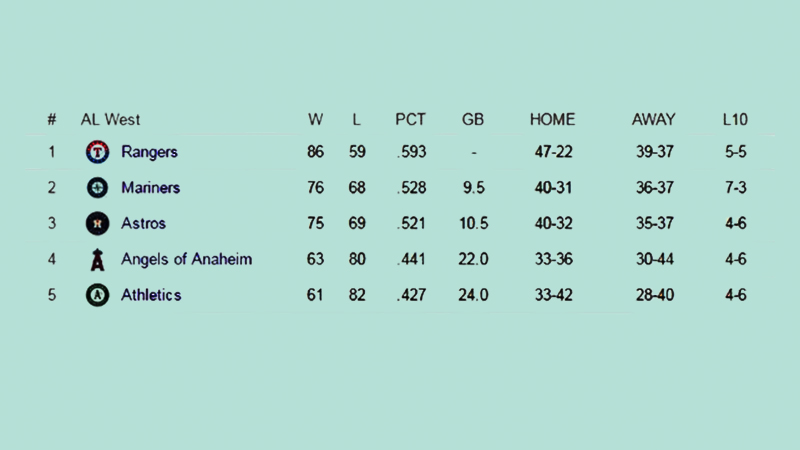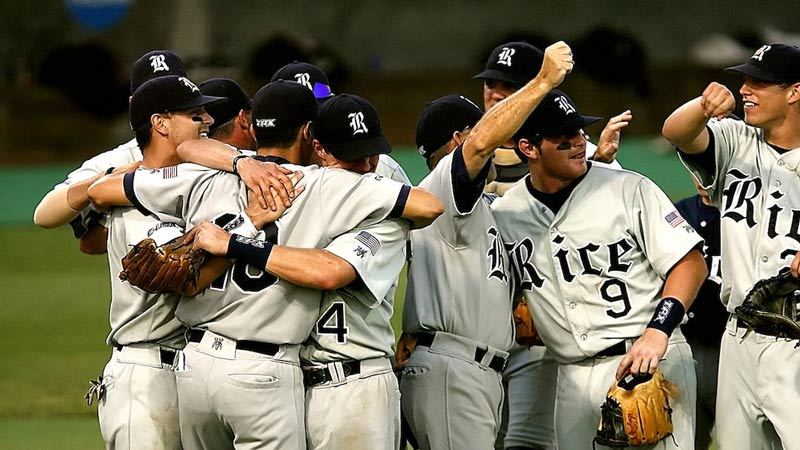Baseball, a sport often described as a game of numbers, has its fair share of peculiar terminologies. Among them, the concept of the “magic number” holds a special place.
With a fascinating allure, the magic number is a mathematical indicator that baseball enthusiasts eagerly anticipate each season. But what does it really mean?
In this article, we delve into the heart of the matter, unraveling the essence of the magic number and its significance in the sport. From its origins to its application, we explore how this seemingly mystical figure influences the race for the playoffs and keeps fans on the edge of their seats.
What Is the Magic Number?
The magic number is a numerical value that indicates the remaining steps required for a team to achieve a specific goal. It represents the total combination of victories by the leading team and defeats suffered by its closest competitor that will result in the desired outcome.
For instance, if a team’s magic number is 5, it means any combination of their wins and the second-place team’s losses that equals 5 will guarantee the leading team’s objective.
How It is Calculated
To determine the magic number, a straightforward formula is employed, taking into account the wins and losses of the leading team as well as the number of games remaining in the season.
The formula can be expressed as:
Magic Number = Total Games + 1 – (Team A Wins – Team B Losses). . .
Here, “Team A” refers to the leading team, while “Team B” represents their closest competitor. The total games encompass the remaining schedule for both teams.
The Variables Involved
Wins and Losses
The number of wins for Team A and losses for Team B is central to calculating the magic number.
Wins are accumulated victories by the leading team, while losses are the defeats suffered by their closest competitor. These variables highlight the performance of both teams throughout the season.
Games Remaining
The number of games remaining in the regular season for both Team A and Team B is another crucial factor in determining the magic number. It represents the opportunities for both teams to accumulate wins or suffer losses, thus influencing the outcome of the calculation.
Illustrate the Calculation Process
Let’s consider an example to better understand the calculation of the magic number. Suppose Team A currently has 90 wins, while Team B has 80 wins. Additionally, there are 10 games remaining in the season for both teams.
Magic Number = 10 + 1 – (90 – 80) = 10 + 1 – 10 = 1
In this scenario, the magic number for Team A to secure their objective (such as clinching a division title) is 1. This means that any combination of Team A’s wins and Team B’s losses that adds up to 1 will guarantee the desired outcome for Team A.
By employing the formula and considering the relevant variables, teams, fans, and analysts can closely track the magic number throughout the season and anticipate the impending playoff scenarios.
Significance of the Magic Number

There are a few points of significance the magic number holds in the context of baseball. They are discussed right below.
Clinching the Division Title
What It Means to Clinch
Clinching the division title signifies that a team has secured the top position within their division, guaranteeing them a spot in the playoffs. It is a significant achievement that showcases the team’s dominance over their divisional rivals throughout the regular season.
Clinching provides the team with a sense of accomplishment and also allows them to plan for the upcoming postseason.
How the Magic Number Helps Determine When a Team Clinches
The magic number plays a pivotal role in determining when a team officially clinches the division title. As the season progresses, the magic number decreases with every win by the leading team or loss by their closest competitor.
When the magic number reaches zero, it means that the leading team has mathematically eliminated any possibility of being overtaken by their rivals. This prompts celebrations and solidifies their status as the division champions.
Playoff Scenarios
The Magic Number for Securing a Wild Card Spot
In addition to the division title, teams also aim to secure a Wild Card spot, which provides an opportunity to participate in the postseason. The Wild Card spot is awarded to the top non-division-winning teams in each league.
The magic number is crucial in this scenario as well, as it determines how close a team is to securing one of these coveted spots. The lower the magic number, the closer the team is to clinch a Wild Card berth.
The Magic Number for Home-field Advantage
Home-field advantage in the playoffs can greatly impact a team’s performance and chances of advancing. The magic number also comes into play when determining which team secures home-field advantage throughout the postseason.
The team with the best record in their league earns this advantage, and the magic number helps track their progress toward achieving this goal. As the magic number decreases, the team edges closer to securing a home-field advantage, which often brings a significant boost in confidence and support from their home fans.
Excitement and Anticipation Among Fans
The magic number creates a sense of excitement and anticipation among fans as the regular season nears its end. It serves as a tangible measurement of a team’s progress toward achieving its goals, fueling discussions and debates among fans and analysts.
As the magic number dwindles, the atmosphere becomes electric, with fans eagerly following each game and rooting for outcomes that favor their team. The magic number adds an extra layer of drama to the season, making it an intriguing and captivating element of baseball.
Strategy and Implications
In terms of strategy and implication, the Magic number also holds a greater significance. Here are the facts you need to consider, in this case.
Impact on Team Strategy
Balancing Resting Players Vs. Maintaining Momentum to Decrease the Magic Number
As a team approaches a lower magic number, a strategic dilemma arises regarding resting key players or maintaining the momentum to decrease the magic number further.
Resting players can help prevent injuries and fatigue, ensuring their readiness for the playoffs.
However, maintaining momentum is crucial as it helps build confidence and maintains a winning mentality.
Coaches and managers must strike a balance between resting players and keeping the team competitive to effectively reduce the magic number.
Importance of Head-to-head Matchups With Closest Competitors
Head-to-head matchups against the team’s closest competitors become crucial when the magic number is nearing its conclusion. Winning these matchups directly impacts the magic number, as it decreases with each victory against a direct rival.
Teams must develop game plans and strategies specifically tailored to exploit weaknesses in their competitors, aiming to secure victories that can significantly reduce the magic number and enhance their chances of clinching.
Psychological Effects on Players and Teams
Building Confidence as the Magic Number Decreases

As the magic number decreases, players and teams gain confidence in their abilities and their chances of reaching their desired goals. The realization that they are getting closer to clinching the division or securing a playoff spot instills a sense of belief and motivation.
This growing confidence can enhance performance on the field and lead to a positive mindset that further fuels the drive to succeed.
Pressure and Tension as the Race Tightens
As the race for the division title or playoff spot tightens, the pressure and tension increase for players and teams involved. The shrinking magic number puts the spotlight on every game, making each victory or defeat feel more significant.
Players may feel the weight of expectations from fans, media, and the organization. Managing the psychological aspect becomes crucial, as dealing with pressure and tension can impact performance and decision-making on the field.
It is essential for coaches and managers to address these psychological effects and create a supportive and focused environment for players.
Providing guidance, maintaining open communication, and emphasizing the importance of teamwork can help alleviate the pressure and enable players to perform at their best during critical moments.
The magic number has implications for team strategy, requiring a delicate balance between resting players and maintaining momentum. Head-to-head matchups against rivals become pivotal, as victories directly impact the magic number.
Examples From Past Seasons
If you are still in a sort of confusion, the following scenarios of the past seasons will help you understand the fact.
Notable Instances of Teams Clinching With a Low Magic Number
The 2011 Philadelphia Phillies
In the 2011 season, the Philadelphia Phillies dominated the National League East and showcased their dominance by clinching the division title with an exceptionally low magic number.
With an impressive roster led by pitchers Roy Halladay, Cliff Lee, and Cole Hamels, the Phillies had a strong regular season, amassing a significant lead over their division rivals.
They clinched the division title with an astounding 14 games remaining, demonstrating their dominance throughout the season.
The 2007 Colorado Rockies
The Colorado Rockies had an incredible late-season surge in 2007, captivating fans and observers alike. They entered September with a considerable deficit in the National League West division.
However, they went on a remarkable winning streak, winning 21 of their final 22 games. Their magical run allowed them to clinch the Wild Card spot and secure a place in the playoffs.
This inspiring example showcases how a team can overcome a significant deficit and clinch with an extremely low magic number.
Comebacks and Near-misses in the Race to Decrease the Magic Number
The 2011 Tampa Bay Rays
In the 2011 season, the Tampa Bay Rays found themselves in a thrilling race for the American League Wild Card spot. They faced fierce competition from the Boston Red Sox.
As the regular season approached its conclusion, the Rays had a substantial deficit to overcome. They staged an incredible comeback, winning crucial games and decreasing their magic number.
In the final game of the regular season, the Rays faced the Red Sox in a dramatic matchup. With an improbable turn of events, the Rays clinched the Wild Card spot on the last day of the season, completing one of the most remarkable comebacks in baseball history.
The 2019 Milwaukee Brewers
In the 2019 season, the Milwaukee Brewers were locked in a tight race for the National League Wild Card spot. As the regular season neared its end, the Brewers had the challenging task of decreasing their magic number to secure a playoff berth.
Facing a tough schedule, they won critical games, reducing their magic number and keeping their postseason hopes alive. Their performance in high-pressure situations and ability to win crucial matchups showcased the intensity and drama of a race to decrease the magic number.
These examples highlight the excitement and unpredictability associated with the magic number in baseball. Teams have overcome significant deficits and clinched with low magic numbers, while others have experienced heartbreak in near-misses.
The magic number adds a layer of intrigue to the regular season, making every game and series crucial in determining a team’s fate.
Limitations and Criticisms
There are a few limitations and criticism of this fact that also leave a greater effect on this context. You can find them in the below section.
Lack of Consideration for Remaining Strength of Schedule
One criticism of the magic number is that it fails to account for the varying difficulties of the remaining schedule for teams involved in the race.
Teams with easier schedules may have a lower magic number but might face weaker opponents, giving them an advantage over teams with a higher magic number but tougher opponents.
This limitation raises questions about the fairness and accuracy of using the magic number as the sole determinant of a team’s chances of clinching.
Inability to Account for Tiebreaker Scenarios
The magic number calculation assumes that the team in pursuit of clinching the division or playoff spot will win all their remaining games. However, this assumption does not consider the possibility of tiebreaker scenarios, which can significantly impact the outcome.
In cases where two or more teams are tied in the standings, additional games or tiebreaker rules come into play. The magic number fails to incorporate these tiebreaker scenarios, leading to potential discrepancies between the calculated magic number and the actual outcome.
Arguments Against the Significance of the Magic Number
Some critics argue that the magic number might not be the most meaningful statistic to determine a team’s chances of success.
They claim that a focus on the magic number oversimplifies the complexities of the game and ignores other critical factors such as injuries, team chemistry, and individual player performances.
These factors can have a significant impact on a team’s ability to perform consistently, making the magic number alone an incomplete representation of a team’s true potential.
It is essential to recognize these limitations and criticisms of the magic number concept. While it provides a convenient way to track a team’s progress toward clinching a division or playoff spot, it should not be the sole factor considered when evaluating a team’s chances of success.
Other metrics and contextual factors must be taken into account to gain a comprehensive understanding of a team’s performance and playoff prospects.
Magic Number Clinches in Past Seasons
| Season | Team | Division | Magic Number | Date Clinched |
| 2016 | Chicago Cubs | NL Central | 1 | September 15 |
| 2001 | Seattle Mariners | AL West | 3 | September 24 |
| 2008 | Tampa Bay Rays | AL East | 4 | September 20 |
| 2019 | Los Angeles Dodgers | NL West | 7 | September 10 |
| 2011 | Philadelphia Phillies | NL East | 9 | September 17 |
Memorable Comebacks and Near-Misses in the Race to Decrease the Magic Number
| Season | Team | Division | Starting Magic Number | Final Magic Number | Outcome |
| 2007 | Colorado Rockies | NL West | 6 | 0 | Clinched Division |
| 2011 | Tampa Bay Rays | AL Wild Card | 9 | 0 | Clinched Wild Card |
| 2012 | Oakland Athletics | AL West | 9 | 0 | Clinched Division |
| 2015 | Texas Rangers | AL West | 9 | 0 | Clinched Division |
| 2019 | Milwaukee Brewers | NL Wild Card | 9 | 1 | Secured Wild Card Spot |
FAQs
How is the magic number affected by tiebreaker scenarios?
The magic number does not take tiebreakers into account. In the event of a tie between two or more teams, additional tiebreaker games or criteria are used to determine the division winner, wild card spot, or other playoff positions.
Can a team’s magic number increase?
No, a team’s magic number can only decrease. As a team wins games or their competitors lose games, the magic number decreases. It is not possible for the magic number to increase during the regular season.
Can a team clinch a playoff spot without decreasing their magic number to zero?
Yes, it is possible for a team to secure a playoff spot before reaching a magic number of zero. This can happen if the team has a significant lead over their competitors and their magic number becomes mathematically impossible to reach for the other teams.
What happens if two teams have the same magic number?
If two teams have the same magic number and are competing for the same playoff spot, they may face tiebreaker scenarios to determine the winner. These tiebreakers can involve head-to-head records, divisional records, or other criteria specified by the league.
Does the magic number have any relevance in the postseason?
No, the magic number is specifically used during the regular season to determine when a team can clinch a division title or secure a playoff spot. In the postseason, the focus shifts to series wins and advancing through the playoff brackets.
Verdict
The magic number in baseball holds a special place in the hearts of fans and teams alike. This seemingly mystical figure represents the threshold for clinching a playoff spot, making it a crucial and highly anticipated statistic each season.
As we have discovered, the magic number is not merely a mathematical calculation, but a symbol of hope, excitement, and determination for teams vying for postseason glory.
It adds an extra layer of intensity to the game, as every win or loss can inch a team closer to or further away from achieving their ultimate goal.
So, the next time you hear about the magic number, remember the underlying significance it carries and the thrilling moments it generates as the race for the playoffs reaches its climax in the world of baseball. Have a nice day.







